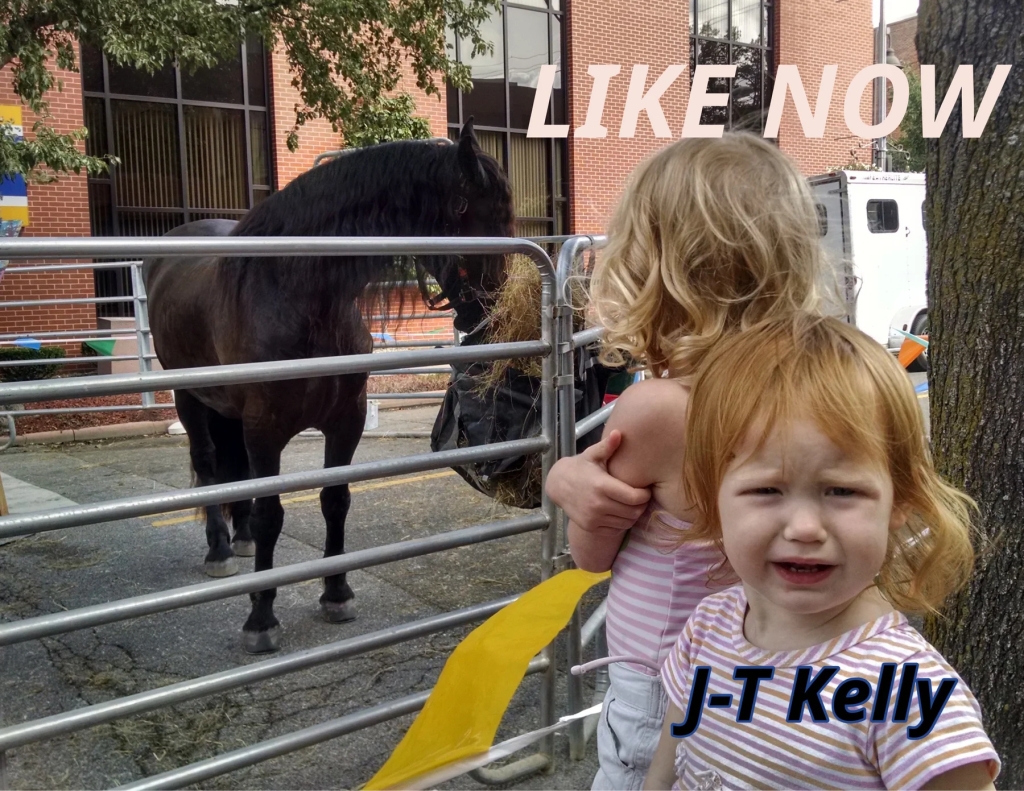by Kyla Houbolt

Here are poems that invite you in with details of a life, and omit just enough of the narrative to drop you into a space of reflection. The implied stories in J-T Kelly’s new chapbook LIKE NOW are intriguing enough that the doors left open are impossible to avoid. We walk through them to ask: are we talking about betrayal? Lost love? Redemption? Perhaps all three.
I can’t afford to bring any love with me on the bus.
Just look at me like that again and you’ll see.
We line up as if.
We sit quietly as if.
(from “This Life is Eating Me Alive”)
Pithy, pungent, and direct, J-T Kelly’s poems deliver a view into the profound as it is found in the quotidian, even the banal. House painters are compared to Caravaggio, in “Art History,” a poem mostly about the art of house painting and the mystery of drunkenness—as well as the appropriate saints.
In Kelly’s chapbook, vignettes about college life are interspersed with love poems and stories of a marriage, of griefs, travels, formative experiences, and strong opinions—all crafted with a deft touch and alive on the page, and told with humor – “I have turned the machine that babbles / to face the machine that archives everything” (“Keeping House”) – and a ferocious understated severity – “…Seventeen / seconds–that’s how much time / a driver should get between a sign / and the thing signified. Ideally. / Often it is less” (“Crossing”).
Mid-collection, two gorgeous sonnets face each other. The first, “Christmas Village,” evokes the scalding pain of a holy day turned plastic with consumer displays to the point of sickness and identification of one’s own well-being with the ability to purchase… what? Implied is the question: who would want what’s on offer in that world? On the facing page, “Squall,” by contrast, reveals a potently tender exchange that bears a loving kindness so abundant it spills over into anguish – the sonnet’s lines conveyed in homely detail, death an unavoided presence. I’d go so far as to say the pairing of these two poems is the heart of the collection. We are visiting that contrast between the falsehoods forced on us by the world and the felt realities of the human soul, the fleshly heart. Fear and its overcoming, generosity and withholding, lasting love and lasting anger all make their voices known.
Another of Kelly’s sonnets, “Strata,” demonstrates direct and uncompromised metaphysics, showing the large and small layers of a fallen world. (Amusingly, this poem faces the previously mentioned “Art History”.)
A sweet delight in Like Now is the generous sprinkling of very short poems. Of these tiny gems the shortest two are only nine words each; the longest is 22. I count eight of these, leaving out two or three that are maybe ten words longer. These micro bites cover much ground, and include at least three love poems (it’s a vague boundary; there are a couple more that might be considered love poems.) Here’s one of those micro love poems, “Love Song From a Marriage”:
I hope you know
I love you even though.
And I hope you
love me even though too.
This is a great example of how leaving out the details can make a poem more powerful by orders of magnitude. Implied here is the thought, “even though… whatever! Anything!” which carries a greater weight than any list of marital grievances. The slight awkwardness in the final line break is sweet, like a bashful person digging a toe into the ground (“gosh”) but, you know, saying the thing anyway.
I think, though, that my favorite micro is the opening poem of the collection, “Unsolicited”:
I don’t like to give advice,
but if I have to tell you something, it’s this:
Don’t tell me what to do.
I’m not going to go into the poem behind the book’s title. I’ll leave that to you to discover and have opinions about, which I hope you will.
Kyla Houbolt has work in Sublunary Review, Barren, Janus, Juke Joint, Moist, Neologism, Ghost City Review, Stone Circle Review, and elsewhere. Her most recent chapbook, But Then I Thought, is now available from Above / Ground Press.
